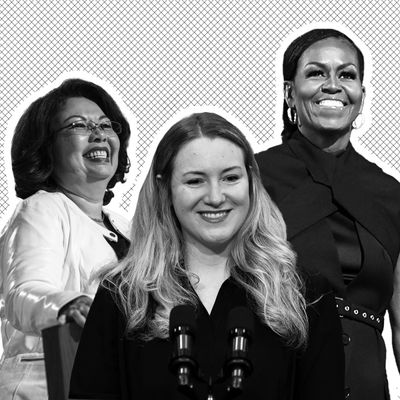
On Tuesday night, nine months after the Texas Supreme Court denied her permission to have an emergency abortion and forced her to flee the state, Kate Cox was at the helm of the Texas delegation on the floor of the Democratic National Convention. “When I got pregnant, doctors told us our baby would never survive, and if I didn’t get an abortion, it would put a future pregnancy at risk,” she said. “But Trump didn’t care, and because of his abortion bans, I had to flee my home.” Then she shared a piece of personal news: “Because I found a way to access abortion care, I am pregnant again. And my baby is due in January, just in time to see Kamala Harris sworn in as president of the United States.”
Cox is one of several speakers who shared their abortion stories and fertility struggles onstage this week in a powerful reminder of the suffering unleashed by the overturn of Roe. (Around one in three women of reproductive age now live in a state where abortion is banned or severely restricted.) Giving space to abortion storytellers onstage at the party convention would have been unimaginable even in recent years, when President Joe Biden, who has struggled on this issue, was still at the top of the ticket, and mainstream Democrats who held on tightly to the concept of “safe, legal, and rare” didn’t take the escalating attacks on reproductive rights seriously. But post-Dobbs, the need for these stories has taken on new urgency as conservatives, not content with just outlawing abortion, set their sights on contraception and fertility treatments such as IVF. With Harris, a more unapologetic abortion-rights advocate than her boss, as the nominee, the DNC leaned into highlighting a wide range of reproductive experiences.
On Monday, Amanda Zurawski and Kaitlyn Joshua recounted how hospitals denied them emergency abortion care in their home states of Texas and Louisiana. “I was in pain, bleeding so much my husband feared for my life,” Joshua said. “No woman should experience what I endured, but too many have.” They were followed by Hadley Duvall, a child sexual-abuse survivor who spoke about being impregnated by her stepfather at age 12. If that had happened to her today in her home state of Kentucky, she wouldn’t be able to get an abortion, as the state’s ban doesn’t allow exceptions for rape or incest. Duvall recalled Donald Trump saying that watching states pass abortion bans is “a beautiful thing to watch.” Staring at the camera, the now-22-year-old asked, “What is so beautiful about a child having to carry her parent’s child?”
Several of Tuesday’s speakers, including former First Lady Michelle Obama, Illinois senator Tammy Duckworth, and social-media influencer Nabela Noor, also spoke candidly about their struggles with infertility. “Cutting our health care, taking away our freedom to control our bodies, the freedom to become a mother through IVF, like I did — those things are not going to improve the health outcomes of our wives, mothers, and daughters,” Obama said. Duckworth, an Army veteran who lost both her legs during an attack in Iraq and who was the first U.S. senator to give birth while in office, said, “My struggle with infertility was more painful than any wound I earned on the battlefield.” This summer, Republicans blocked a bill the senator introduced that would codify the right to access fertility treatments. She added, “Trump’s anti-American crusade has put other Americans’ right to have their own families at risk. How dare the GOP endanger the dreams of countless veterans whose combat wounds prevent them from having kids without IVF.”
Governor Tim Walz and his wife, Gwen, are likely to share their fertility journey, too, when they take the stage on Wednesday night. The couple relied on intrauterine insemination to conceive their children, Hope and Gus, and have spoken publicly about the risks Trump and the GOP present to families who struggle with starting a family.
The push to not only highlight these stories but give them prime-time billing at the Democratic convention has caused some anti-abortion advocates to freak out, calling the efforts a “death cult” and “disgusting.” It also draws a sharp contrast with the Republican National Convention in July, where the word “abortion” wasn’t uttered in any official speech. After half a century fighting to get rid of Roe, conservatives took no victory lap in their first convention since overturning the national right to abortion. It was a clear admission that the horrors unleashed by Dobbs remain an electoral liability for the GOP, as many voters consider abortion a top issue in 2024. It’s also worth noting that, despite attempts to portray the party as more moderate on abortion, the RNC platform explicitly supports states’ rights to enforce the 14th Amendment, a move that prominent anti-abortion activists see as an endorsement of fetal personhood, or the idea that fetuses have the same rights as people from the moment of conception. And that’s without getting into what Project 2025, the far-right presidential-transition plan created by Trump alumni, calls for the next Republican administration to do on these issues, starting with the declaration that “abortion is not health care.”
During an interview with CBS News on Monday, Trump said there should be no federal right to abortion and that he had “no regrets” about his role in overturning Roe. But if the string of pro-choice victories from the past two years is any indication, and the moving stories coming out of the DNC this week further move the needle for women who may be on the fence about who to vote for, he may feel differently come November.
The Cut offers an online tool you can use to search by Zip Code for professional providers, including clinics, hospitals, and independent OB/GYNs, as well as for abortion funds, transportation options, and information for remote resources like receiving the abortion pill by mail. For legal guidance, contact Repro Legal Helpline at 844-868-2812 or the Abortion Defense Network.





